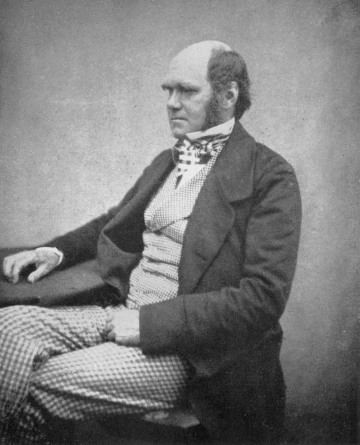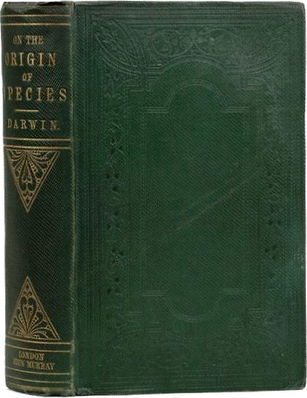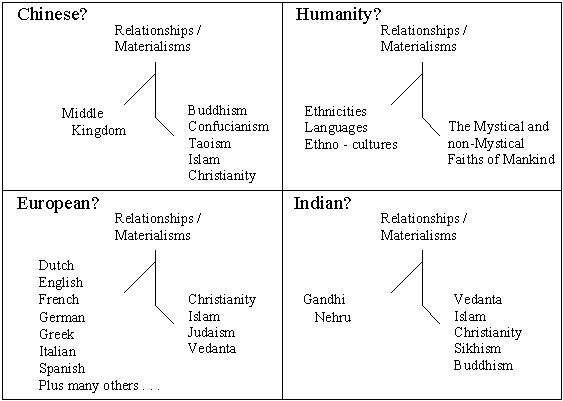Charles Darwin
The Origin of Species 1859

Picture of Charles Darwin aged 51
Taken near the time of the publication
of The Origin of Species
 Charles Darwin's famous work commonly known as The Origin of Species but actually entitled On the
Origin of Species by Means of Natural Selection, or the Preservation of Favoured Races in the Struggle for Life was first published on 24 November 1859. There were only
1,250 copies prepared in this first edition, and Darwin had suggested to his publisher that even this would
be too many for what he presumed to be a limited market. Charles Darwin's famous work commonly known as The Origin of Species but actually entitled On the
Origin of Species by Means of Natural Selection, or the Preservation of Favoured Races in the Struggle for Life was first published on 24 November 1859. There were only
1,250 copies prepared in this first edition, and Darwin had suggested to his publisher that even this would
be too many for what he presumed to be a limited market.
Although the book was priced at fourteen shillings - more than a week's wages for a labourer and hence
beyond most persons convenient means -
and its content was slightly technical this edition sold out to the book trade on the day of publication.
A second edition of 3,000 copies was issued some two months later.
Few books have had such a profound and far-reaching impact on Human Society across the world.
It made its appearance in an English, European and World context where, in so far as
people had considered such things, faith had long determined peoples ideas about the origins of species of
animals and plants with which the planet was populated. Even the existence of the Earth itself together with
the Sun, Moon and Stars were generally thought to result from Acts of Divine Creation.
Charles Darwin, as a boy, had been a keen hunter of rats with dogs, had moved on from this
to hunting game-birds, and in his late teens became a serious collector of as many species of beetle as
he could lay his hands on building up a large and valuable collection of preserved specimens.
Although not academically inclined by temperament his strict father, a well-off and respected doctor,
encouraged him to study medicine in Edinburgh, (where he seems to have become interested in Zoology having
several serious Zoologists as friends). Charles Darwin proved unsuccessful as a medical student whereupon
his father then suggested he train as a minister of religion. After some reflection
on the matter, during which time he admitted himself as being able to accept many tenets of Christian faith,
Charles Darwin prepared himself for admission to Cambridge University with the view of taking the necessary
courses to qualify himself as a clergyman.
As at Edinburgh so also in Cambridge, his recognised course work being somewhat neglected in favour
of his own passionate interest in Natural History. Darwin began a long-term friendship J.S. Henslow,
a young Professor of Botany which led on to other influential contacts with other academics in such fields
as Geology.
Although Charles Darwin took a degree consistent with a potential future as a minister of religion
his friendship with Henslow led to his being offered, at Henslow's recommendation, a post as Naturalist
on a british naval ship on a voyage to the coasts of South America and then on into the Pacific Ocean.
It was during what proved to be a five-year voyage (1831-1836) on the HMS Beagle that Darwin was
experience many Geological phenomena, including an actual earthquake, and many Biological phenomena,
such as fossils that he held to be unaccountable under the prevalent Linnean System of Species Classification,
that led him to increasingly doubt the Biblical view of the Origin of Species that he had previously accepted.
On the voyage it was a matter of increasing doubt only; further reflection came back home in England,
where he was engaged in arranging for the documentation and classification of his many discoveries and
in preparing several acounts of his voyage and his findings for publication.
A relevant passage in the introduction to the first edition of The Origin of Species reads:-
When on board HMS Beagle, as naturalist, I was much struck with certain facts in the distribution of the inhabitants of South America, and
in the geological relations of the present to the past inhabitants of that continent. These facts seemed to me to throw some light on the origin
of species - that mystery of mysteries, as it has been called by one of our greatest philosophers.
A key stage in his development of an inherently
persuasive hypothesis about a scenario where there would be a naturally explicable origin of species being his
reading, late in 1838, of an Essay by the Reverend
Thomas Malthus.
To use Charles Darwin's own words from his Autobiography.
I happened to read for amusement Malthus on 'Population', and being well prepared
to appreciate the struggle for existence which everywhere goes on from long-continued observation
of the habits of animals and plants, it at once struck me that under these circumstances favourable
variations would tend to be preserved, and unfavourable ones to be destroyed. The result of this
would be the formation of a new species. Here, then, I had at last got a theory by which to work.
Darwin had noted that within established species slight variations in form often seemed to naturally occur.
He postulated that it was in a most critical aspect of existence - that of being physically able to gain
the food whereby any individual could be nourished to survive and to breed - that a decise causal process
in the origin of species might be held to lie. Those variations that result in individuals which could
win enough nutrition to survive and breed would triumph in the struggle for existence over those individuals
whose attributes did not suit the winning of sufficient nutritional support.
To quote from The Origin of Species:-
As many more individuals of each species are born than can possibly survive; and as, consequently, there is a frequently recurring
struggle for existence, it follows that any being, if it vary however slightly in any manner profitable to itself, under the complex and sometimes varying
conditions of life, will have a better chance of surviving, and thus be naturally selected. From the strong principle of inheritance, any selected variety
will tend to propagate its new and modified form.
There would be many cases of origin of species that could be so successful in the food-related struggle for existence but also cases of extinction for
those species that could no longer be successful as increasingly adapted species won available food-stuffs to support their own survival.

The Faith versus Reason Debate
The Wisdoms and Insights available on our
site include some about Human Existence itself:-

If Charles Darwin were alive today we at Age-of-the-Sage would be urgently seeking to interest him
in our discovery of the fact that there is close agreement between several major World Faiths, Plato,
Socrates, Pythagoras and Shakespeare in suggesting that Human Wisdom / Spirituality is relative to
Human Desire / Materialism and to Human Wrath / Ethnicity.
|
|
![[darwin, origin of species]](theory_of_evolution.gif)
![[darwin, origin of species]](theory_of_evolution.gif)